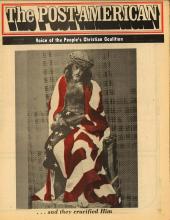It seems that if God really wanted to communicate to all of humankind, Christ would have come in the 20th century. Jesus Christ Superstar suggests that if Christ would have come when we had mass communication, then the world would have reacted much more favorably towards him. It certainly seems that he could have been exposed to many more people; but on second thought, what would be the response if Christ were to come to
Would not the people who call themselves Christians be most offended by him, rejecting him because he associated with outcasts: blacks, hippies, radicals, street people, and other "undesirables"? They would be appalled that he hung around bars, communes, the streets, and other "questionable" places. "Surely the company you keep and the places you go are a reflection of what kind of a person you are." They would fail to see that these were the people who were most realistic about their personal and social situation, and their need for liberation. Seeing him only as a threat to their comfortable way of life, they would totally miss his real message of how he could set them free personally and socially, and transform their whole existence.
When he refused to fight in our army, wouldn't our militarists call him a subversive, our nationalists claim that he was not a true American? When it got around that he was telling people not to let
Read the Full Article

